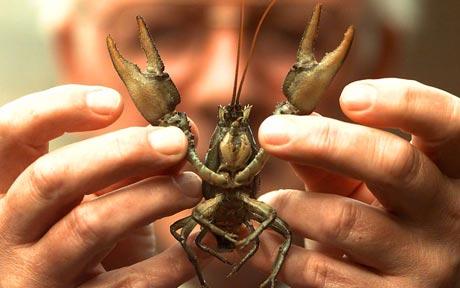![]()
Environmentalist ate native crayfish
April 13, 2010
A keen environmentalist has been ordered to pay £4,000 after catching, cooking
and eating endangered native crayfish.
 Up to 95 per cent of Britain's endemic 'white-claw' crayfish
population has been wiped out by invaders since the 1970s Photo: EDDIE MULHOLLAND
Up to 95 per cent of Britain's endemic 'white-claw' crayfish
population has been wiped out by invaders since the 1970s Photo: EDDIE MULHOLLAND
Christopher Hemsley, 41, thought he was doing a good deed by catching what he believed to be invasive American signal crayfish in a trap his wife had bought him.
But it turned out he had actually caught up to 40 white-clawed crayfish, a species classed as 'vulnerable' on the International Union for Conservation of Nature (IUCN) Red List.
Populations of white-clawed crayfish have shrunk rapidly since the 1970s, out-competed by signal crayfish, which were accidentally released from fish farms.
Hemsley, a salesman and active environmentalist from Leeds, was on an outdoors weekend break with friends he had met tree planting when he trapped the native crayfish in the River Kent at Staveley in the Lake District.
A passer-by spotted them and alerted the Environment Agency, which called in the police.
Hemsley, who believed he had done nothing wrong, promptly told the police that they had trapped some 40 crayfish over the weekend.
When told what the crustaceans were, Hemsley admitted killing white-clawed crayfish contrary to the Wildlife and Countryside Act 1981; and taking fish in an inland water with a trap without a licence, contrary to the Salmon and Freshwater Fisheries Act 1975.
John Batty, defending at South Lakeland Magistrates' Court, said Hemsley was thoroughly embarrassed about what he had done.
Diana Matthews, chairman of magistrates, imposed a fine of £3,500 for killing the crayfish and £400 for trapping them, and ordered to pay £85 costs and £15 victim surcharge, making a total of £4000.
Matt Brazier from the Environment Agency, said afterwards that the perception that trapping and killing signal crayfish benefited their native rivals was often misplaced.
"As this case demonstrates this can do more harm than good," he said.